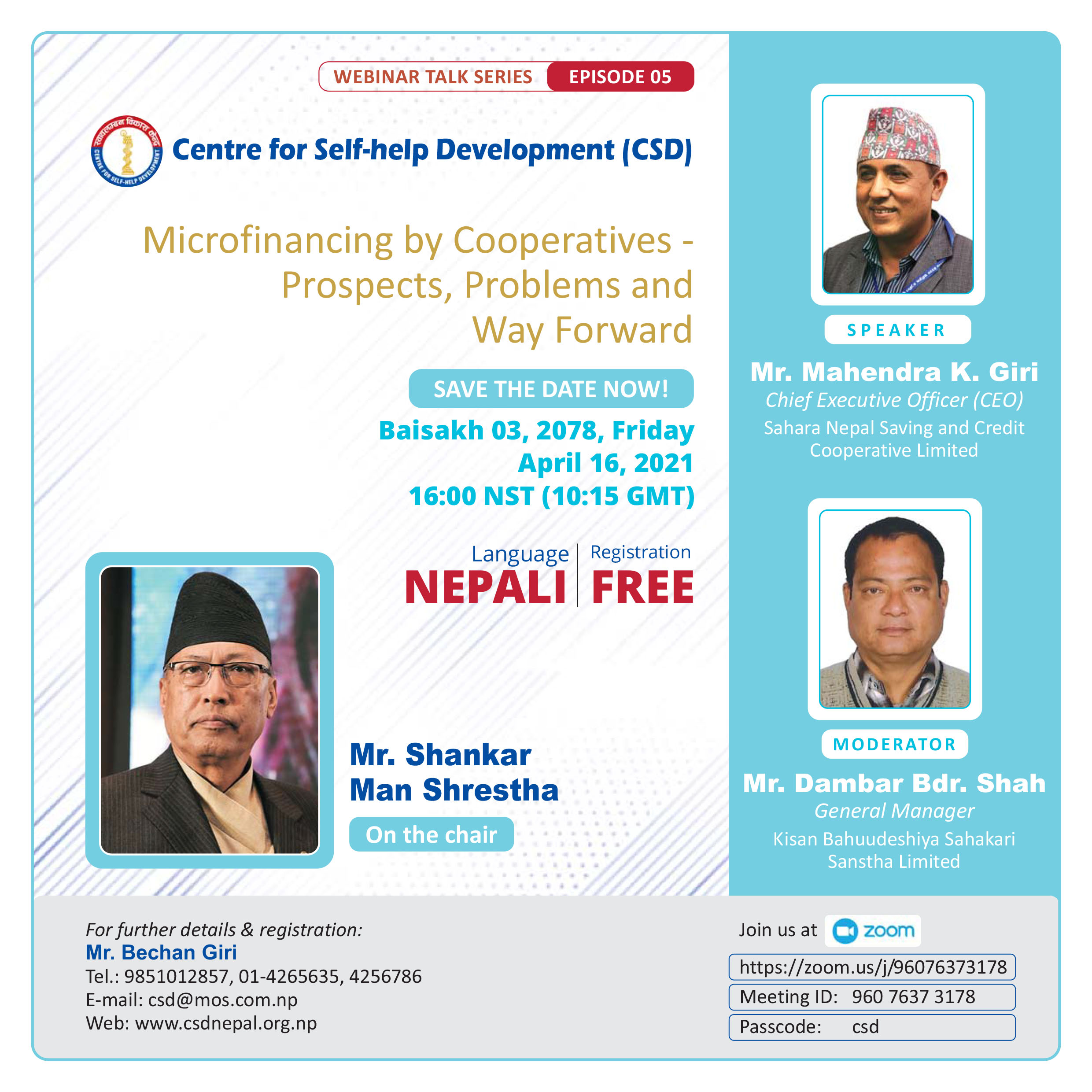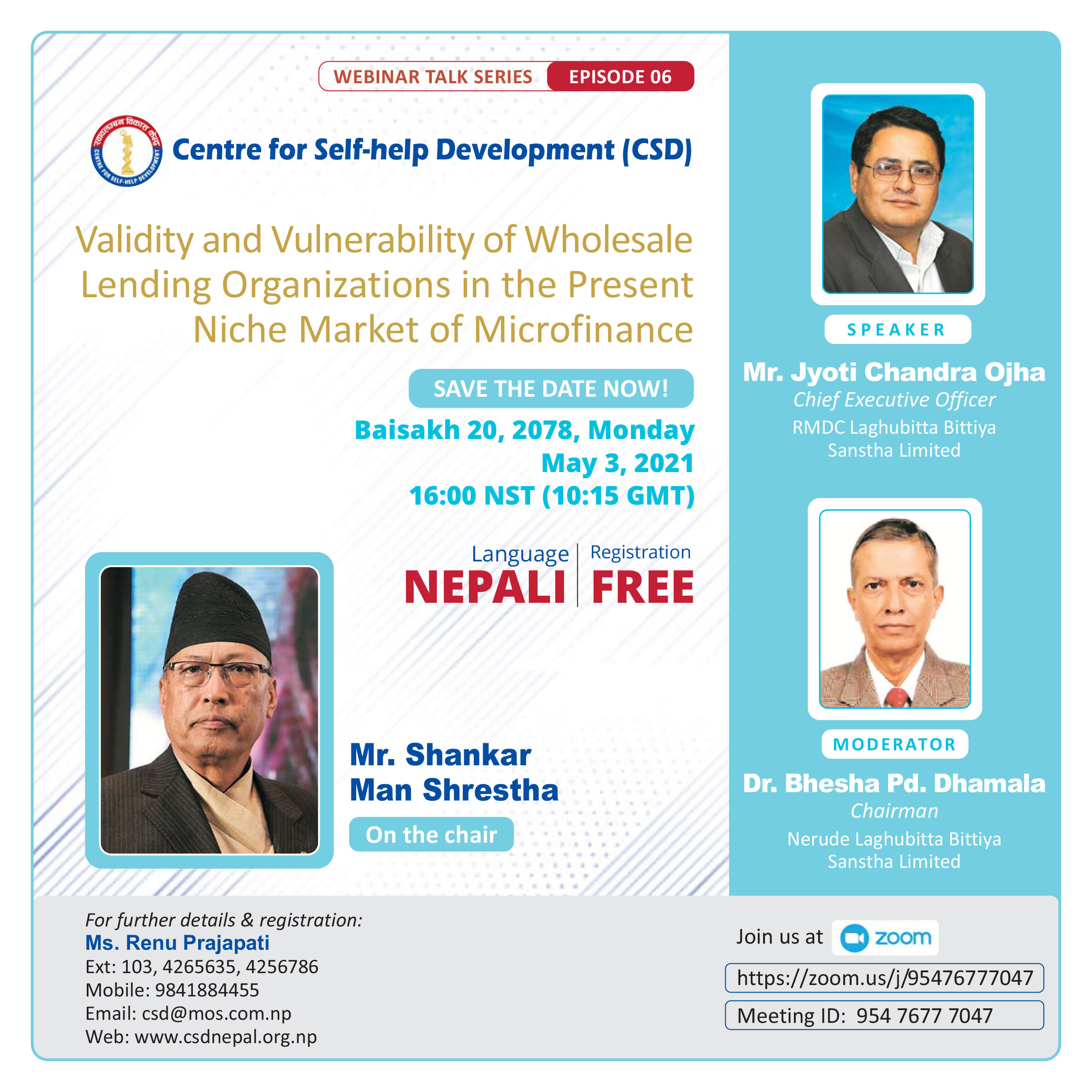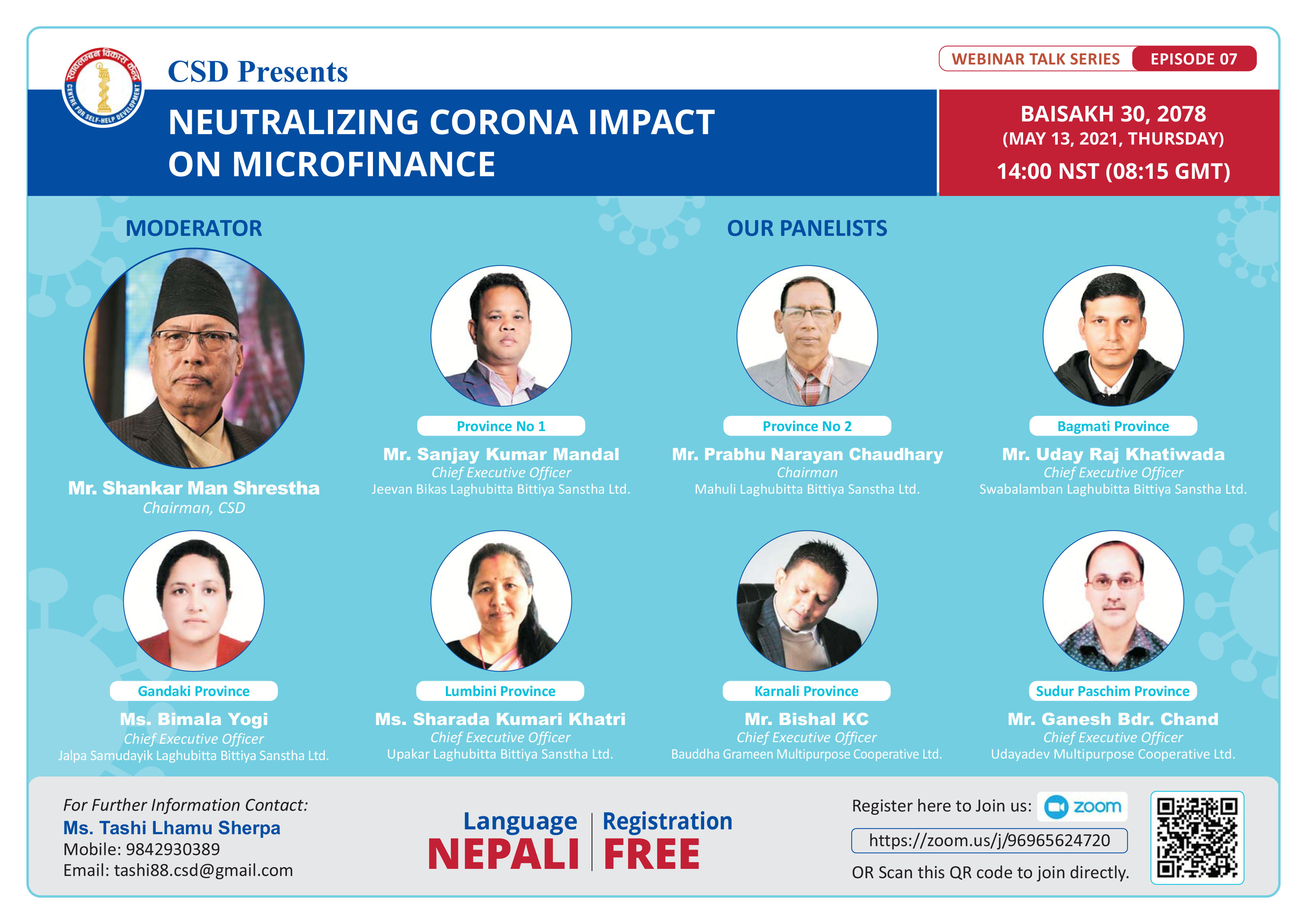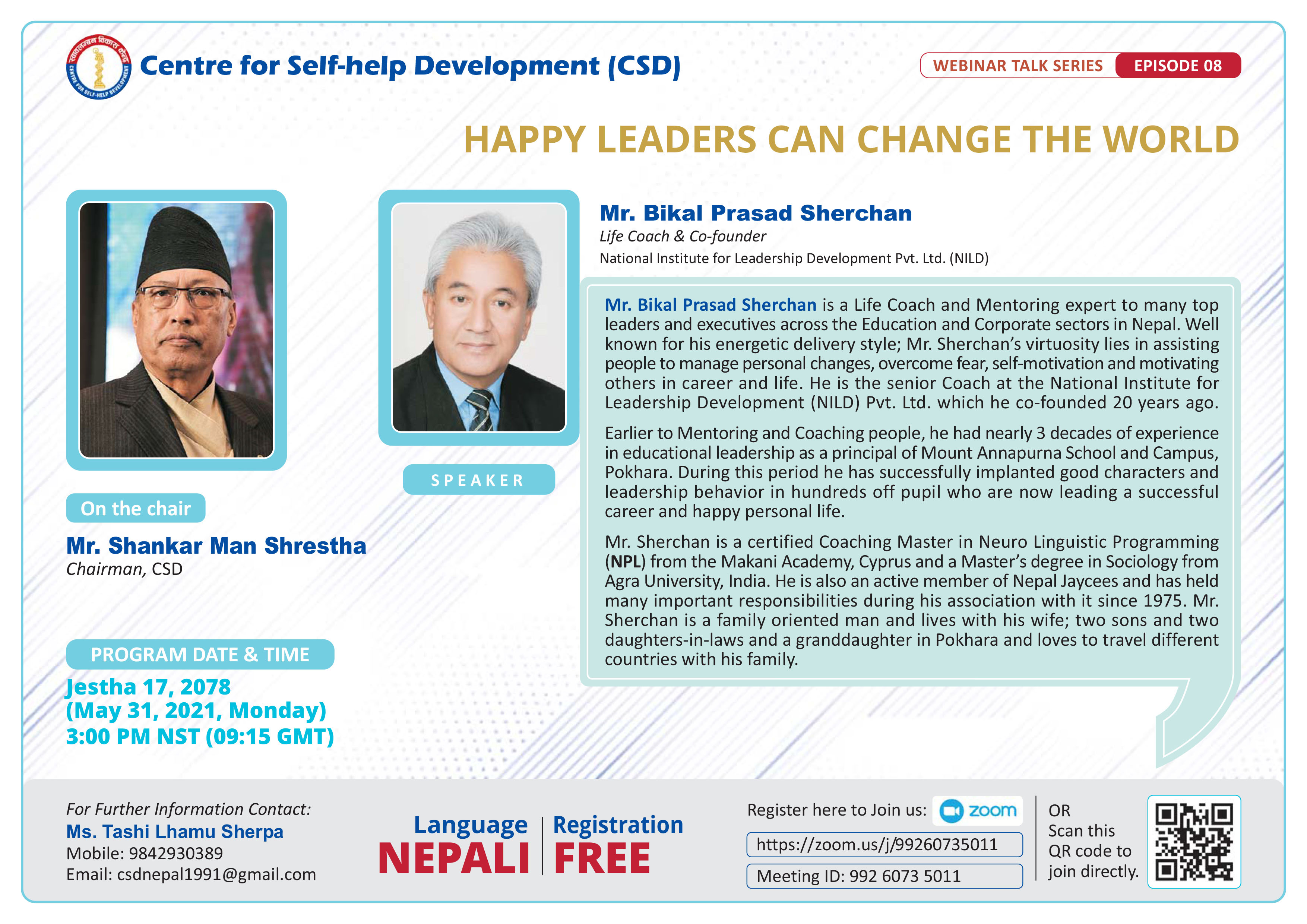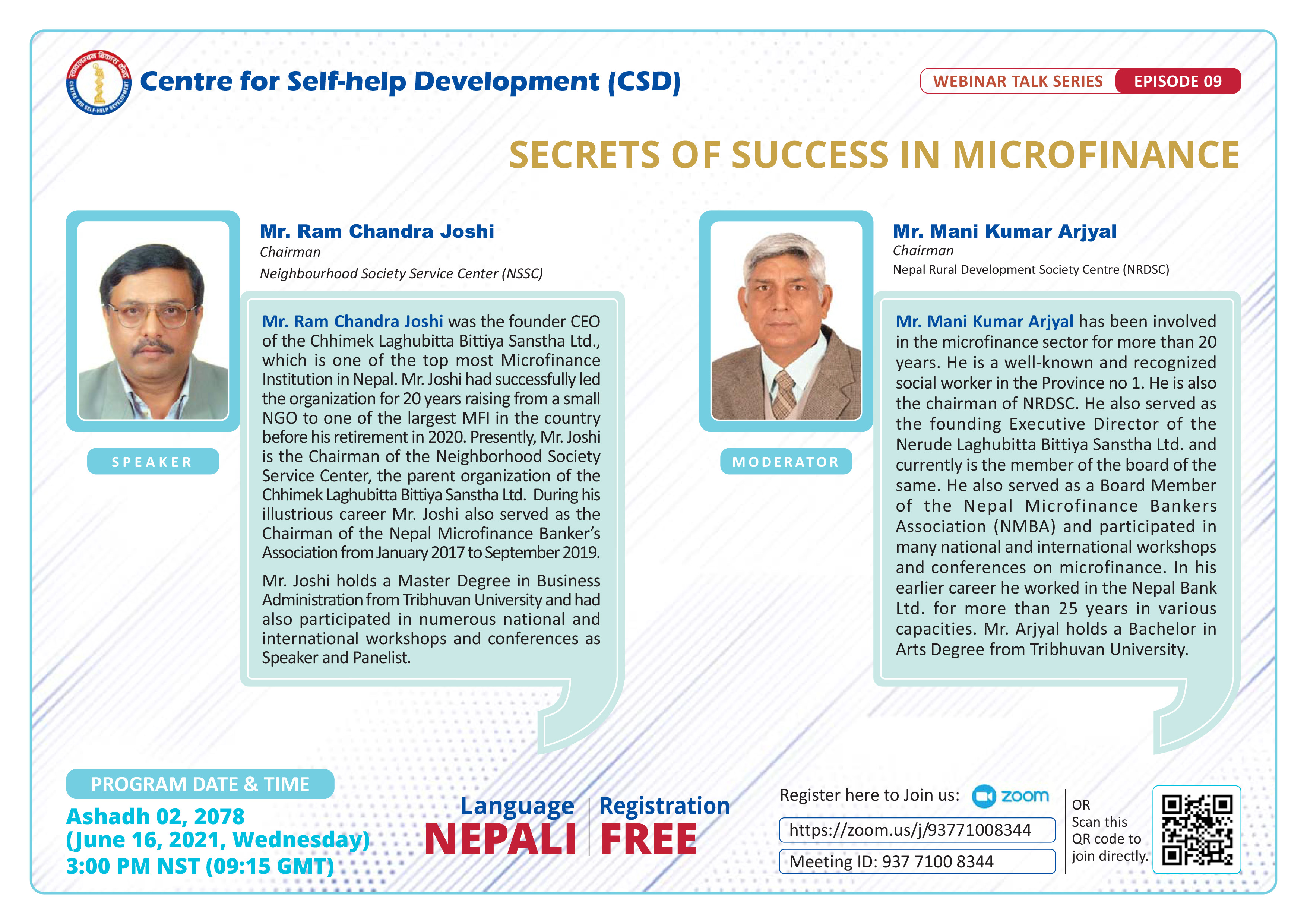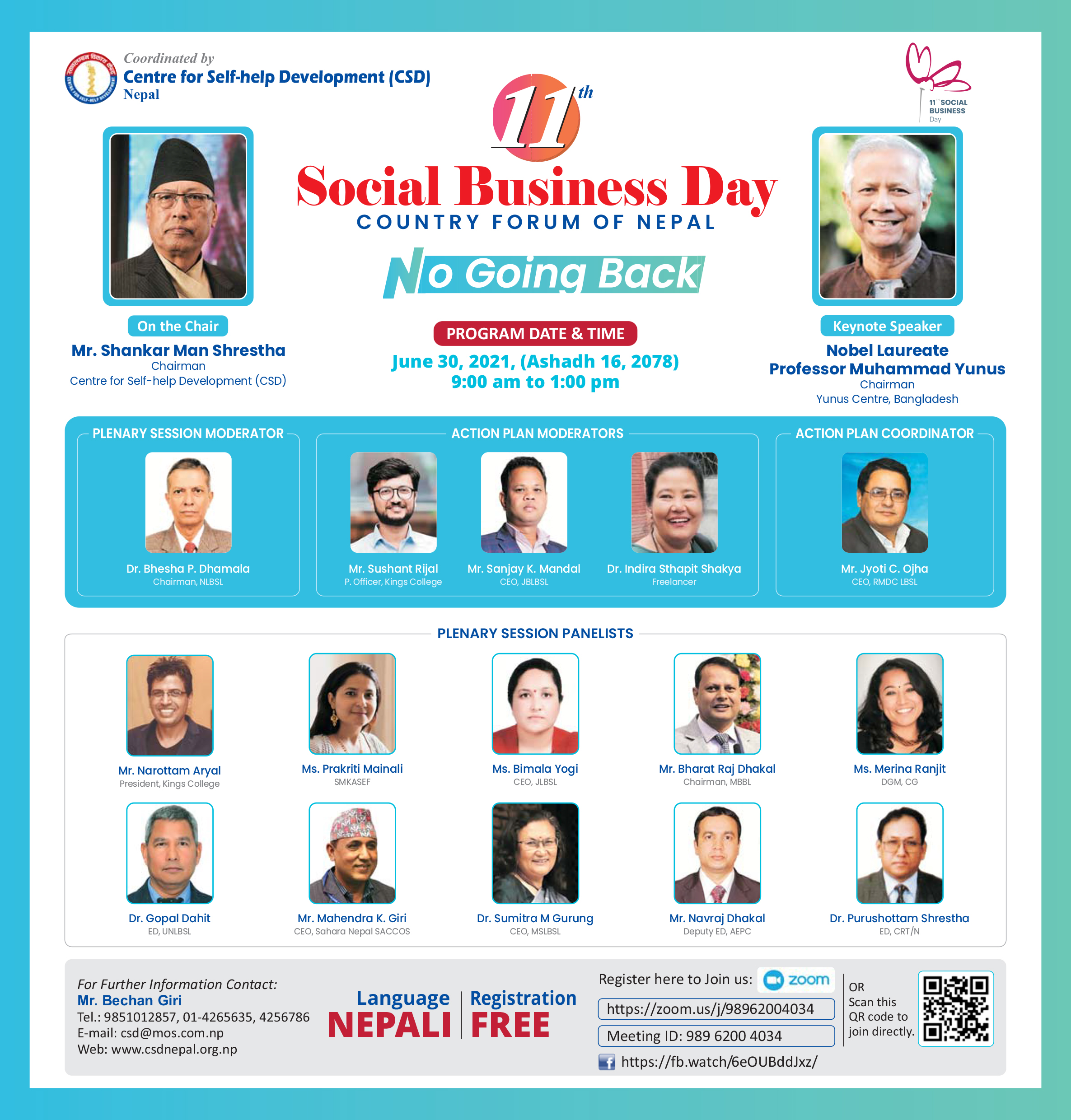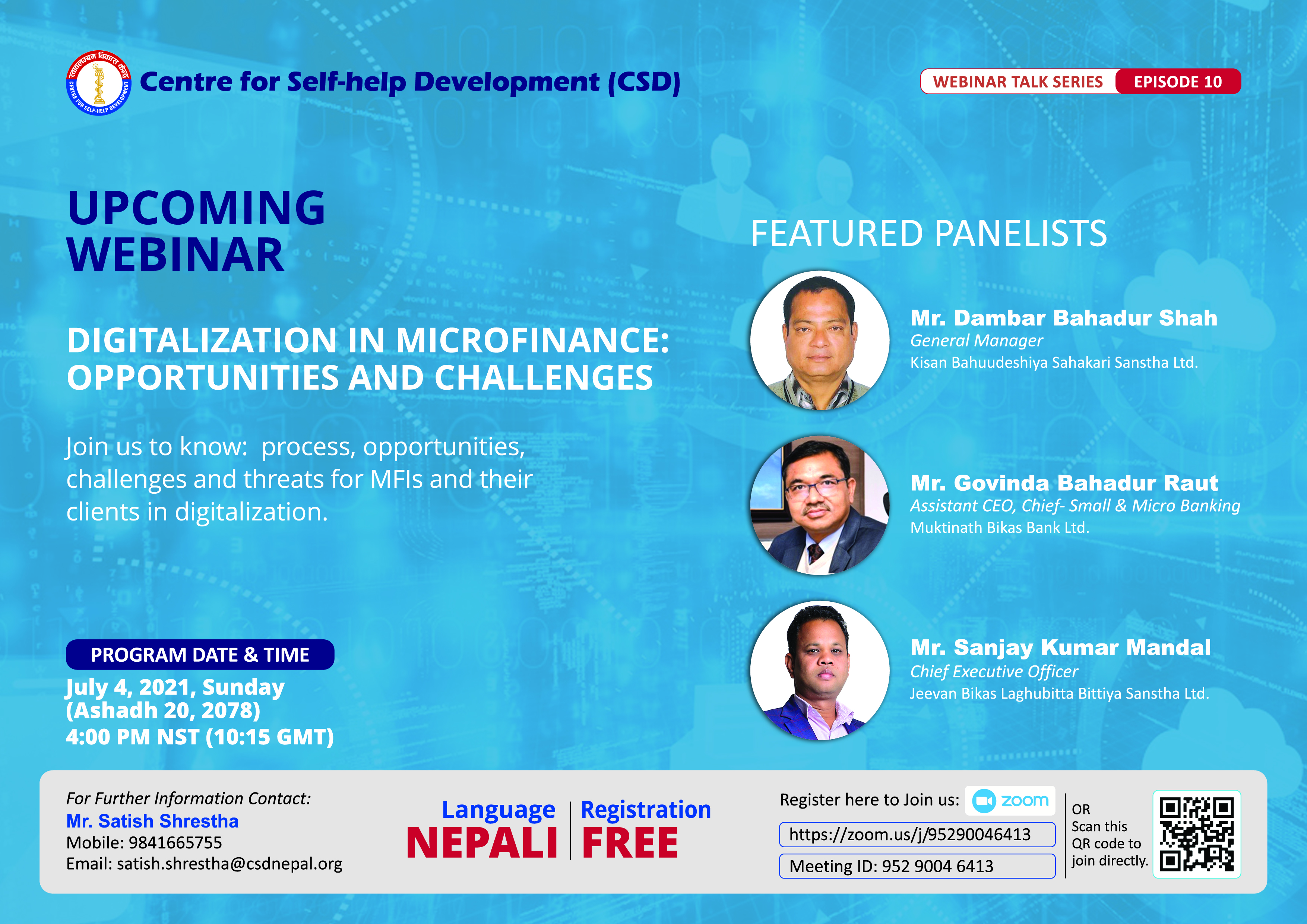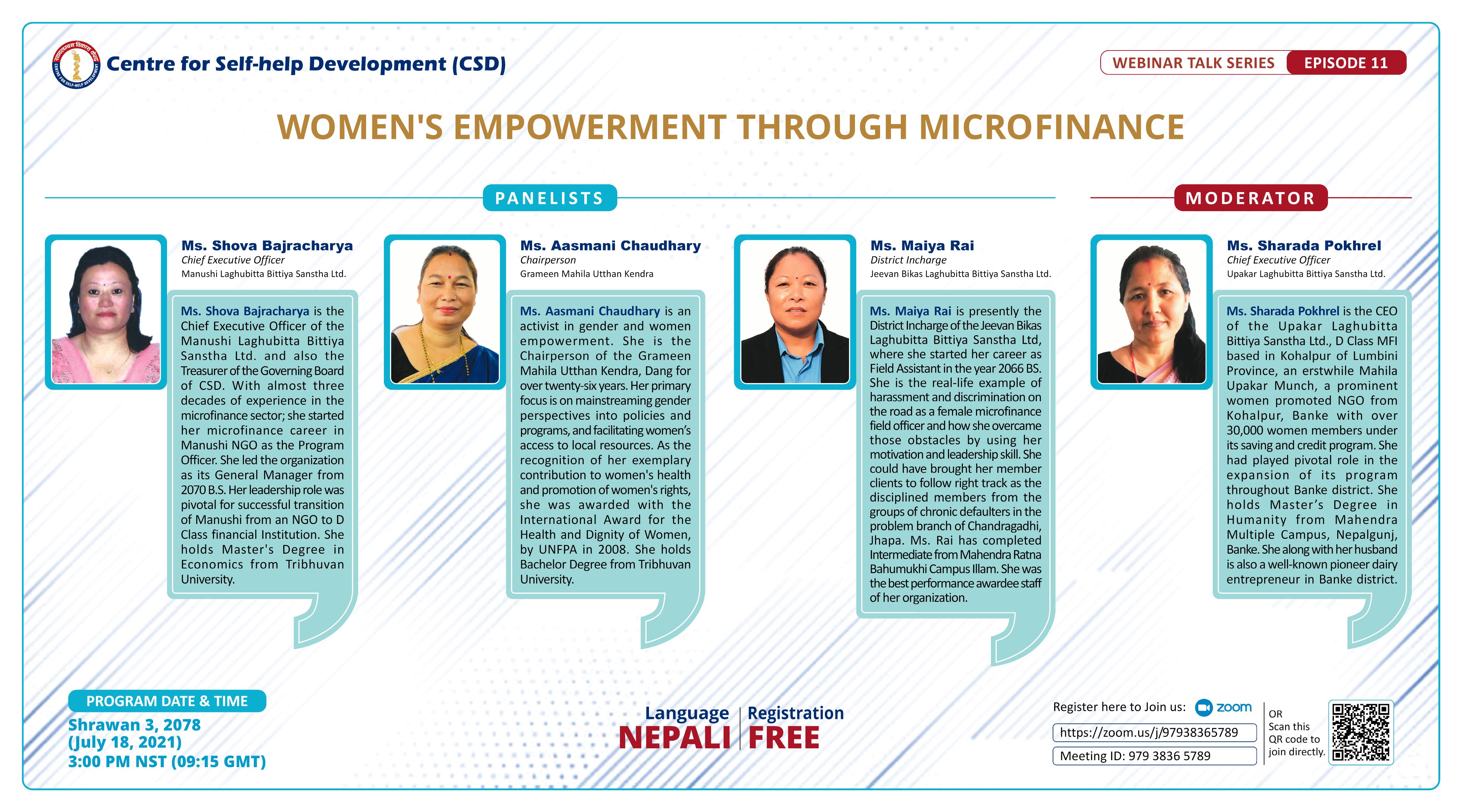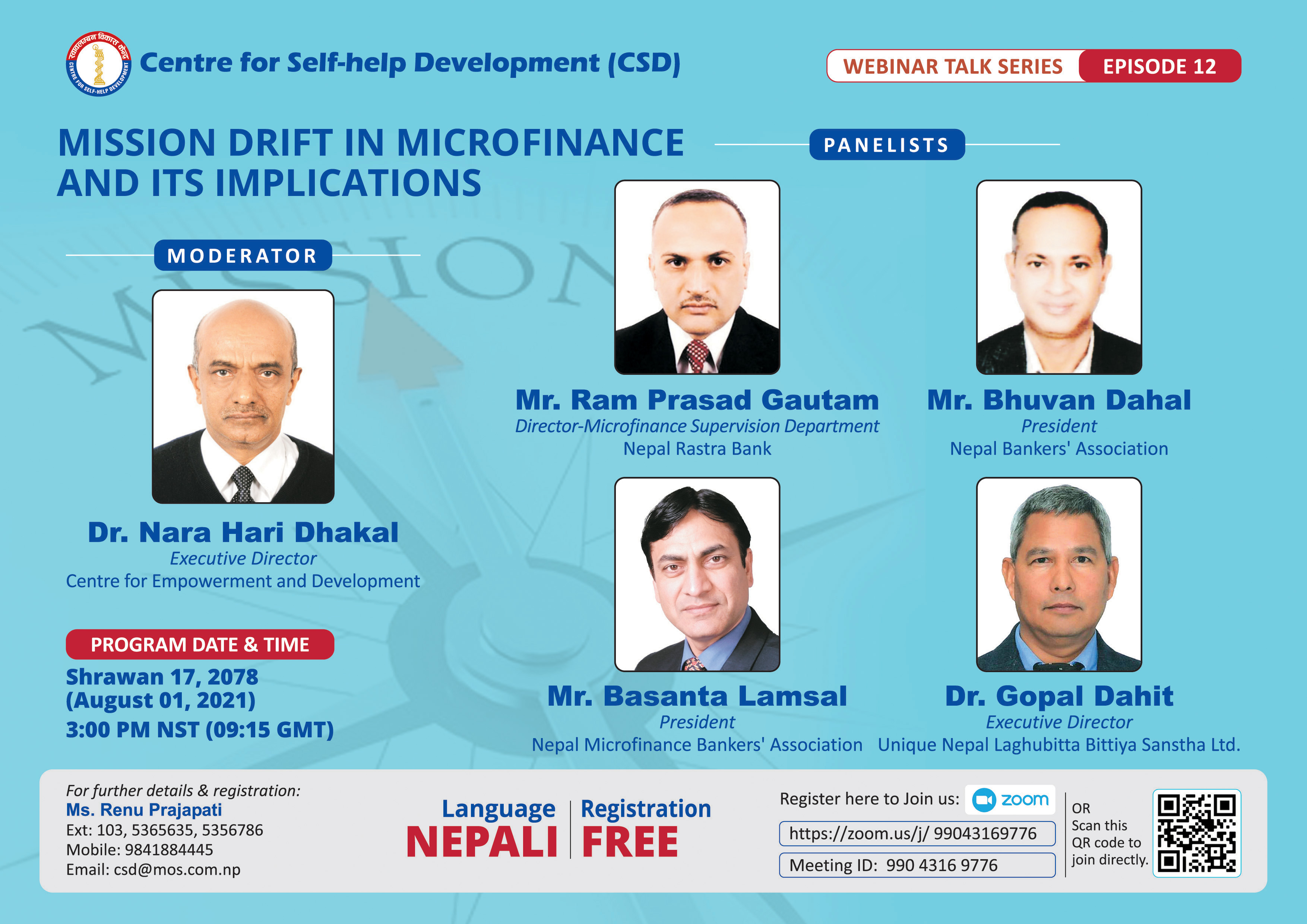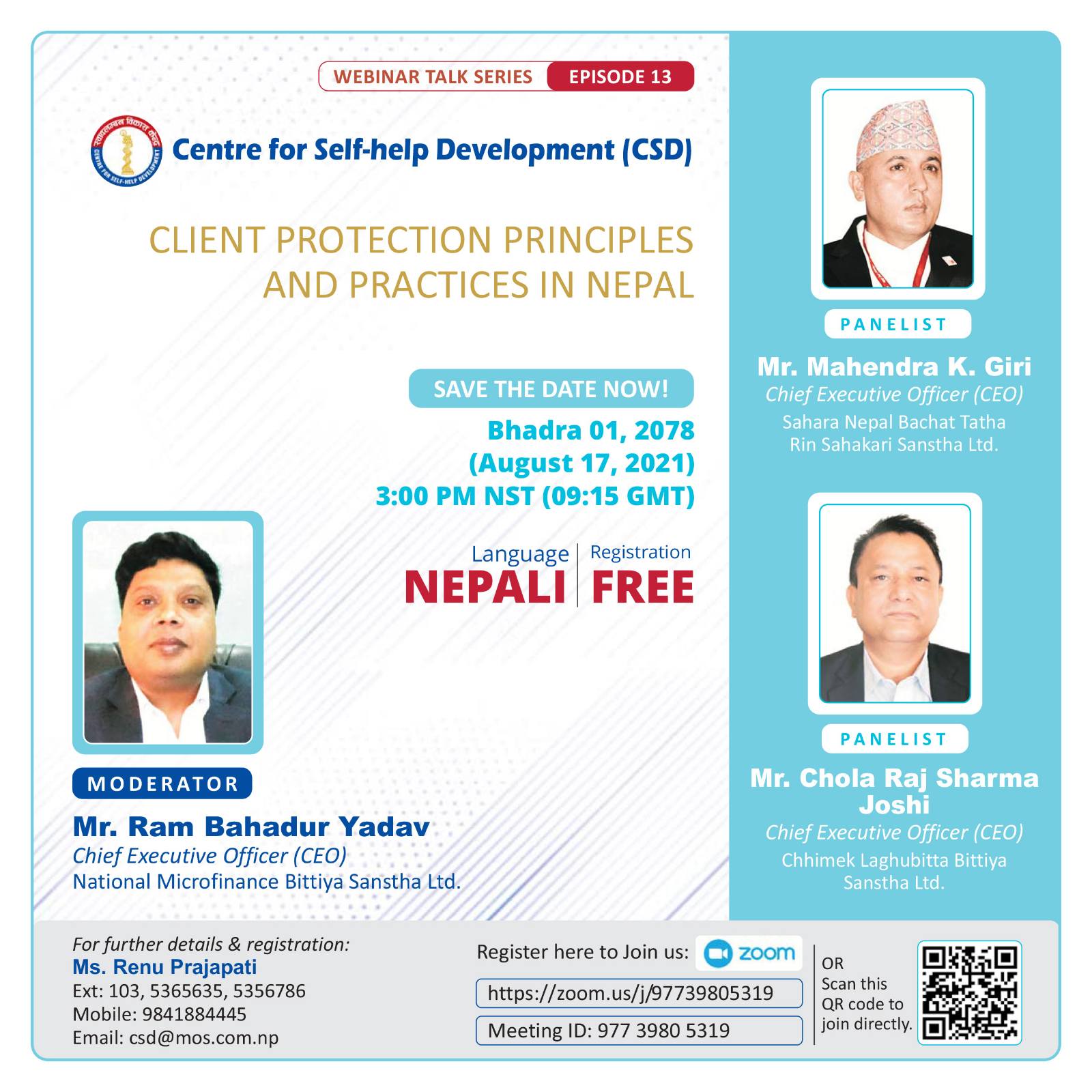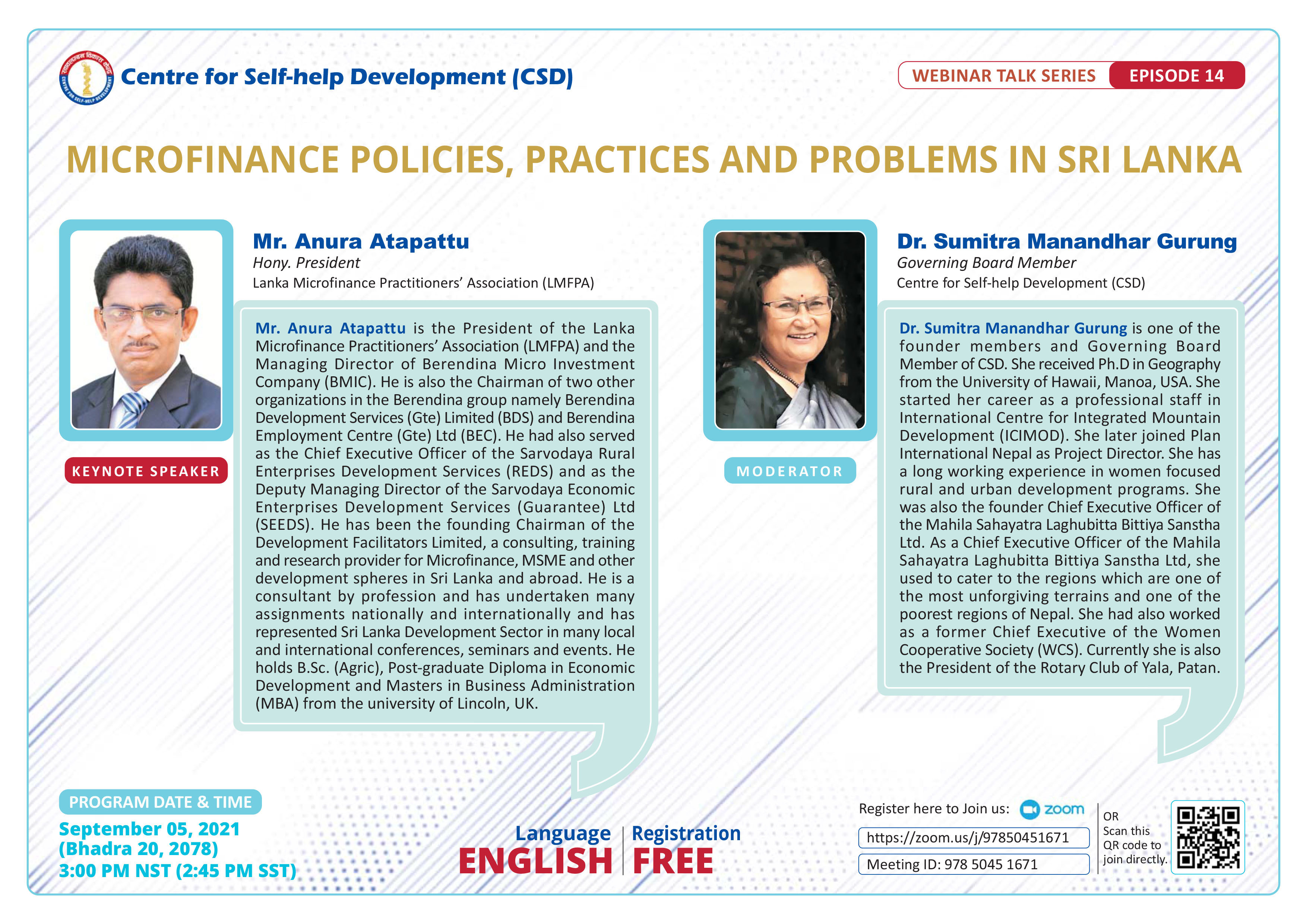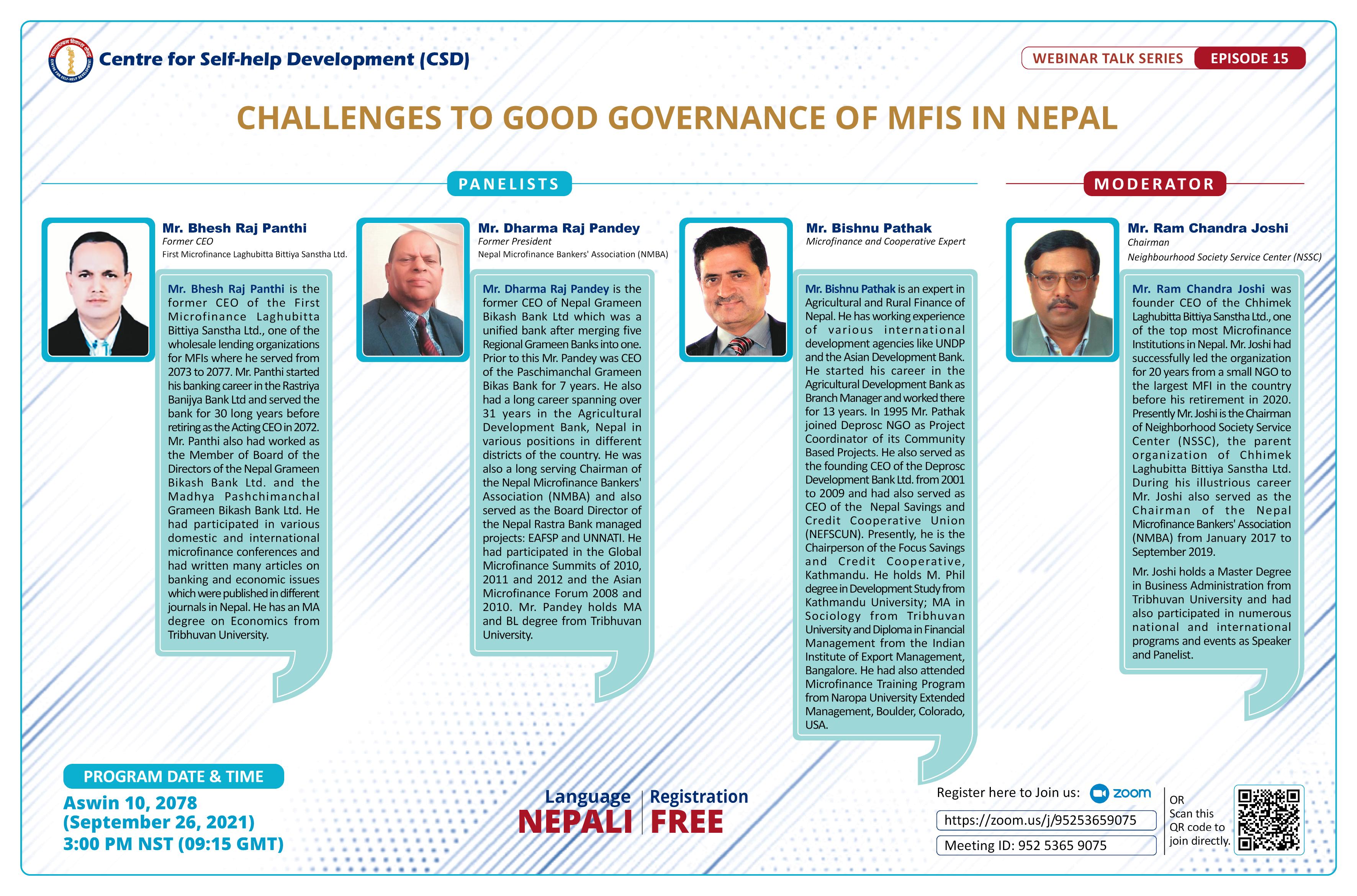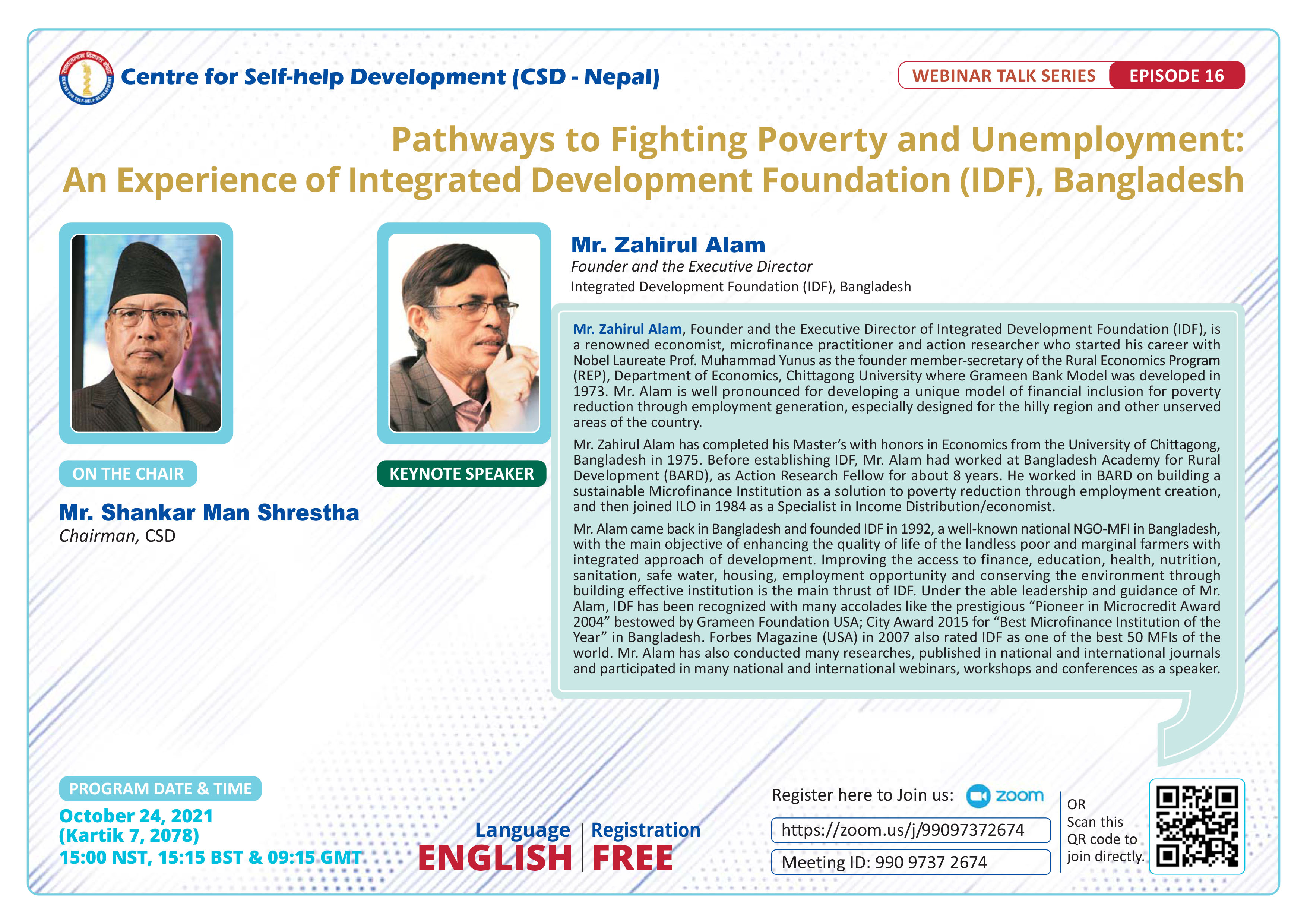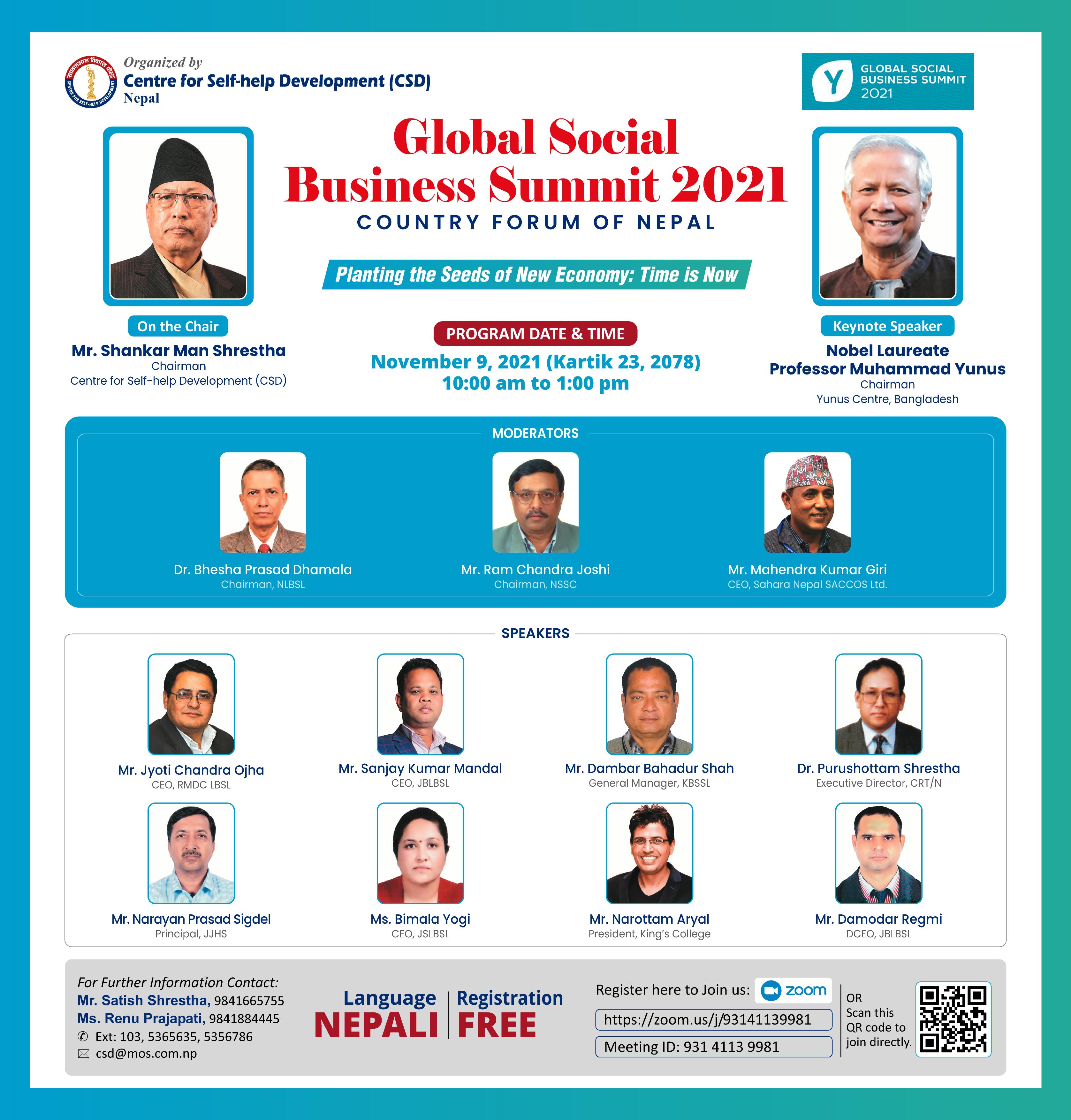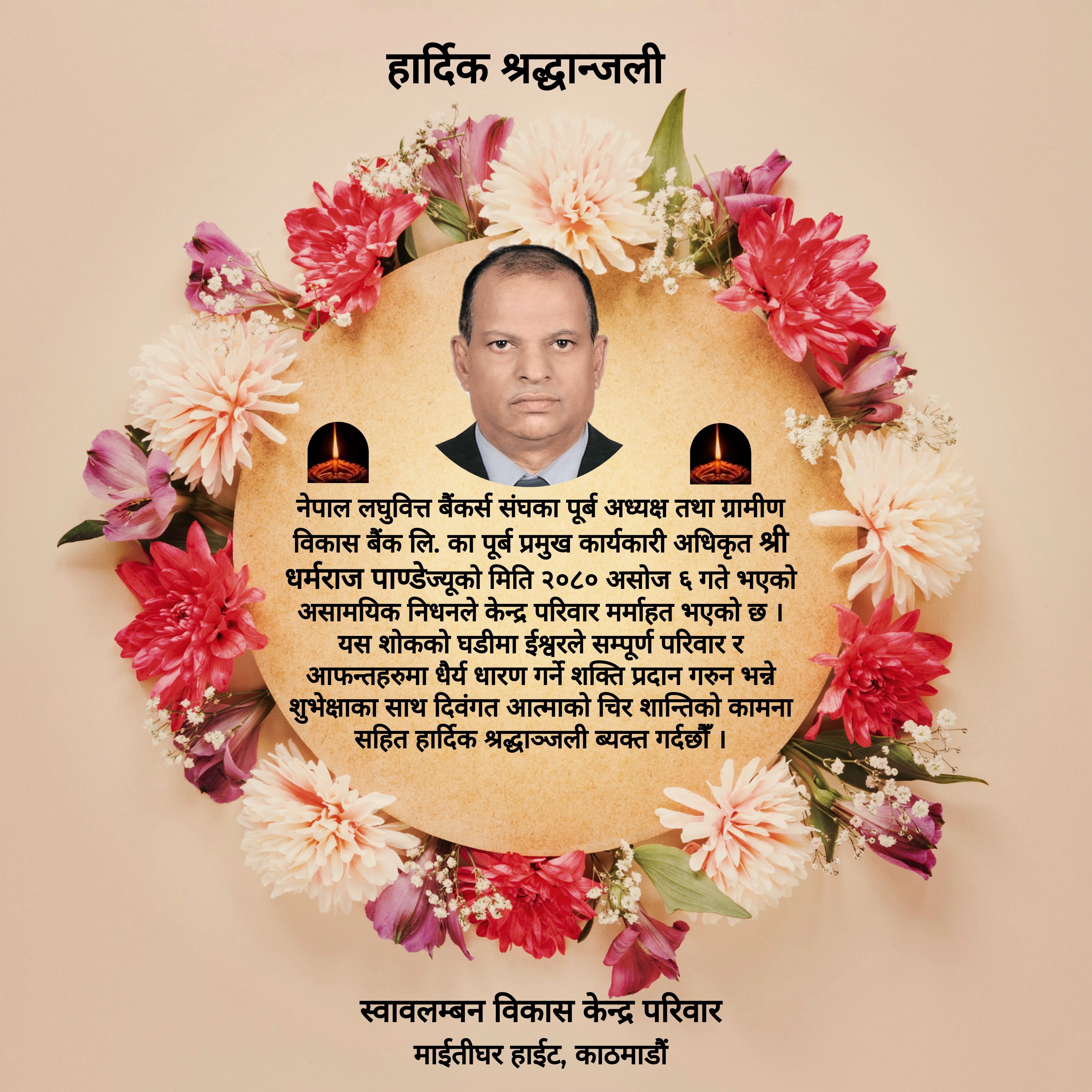The Centre for Self-help Development (CSD) organized a webinar talk on “Experience of Grameen Koota on Poverty Reduction and Employment Creation in India” to acquaint microfinance and cooperative officials, staff and concerned stakeholders with policies, strategies and working modalities for dealing with pertinent issues like poverty reduction, employment generation as well as overall sustainability of the MFIs. It focused on the business model of Grameen Koota based on the strategy of sustainability, resilience and socially relevant concept to tackle these issues as well as overall long term viability of MFIs . The talk program also prioritized on corporate governance policy to achieve highest standards of professionalism, ethics, accountability and integrity as well as disclosure and transparency in its business operations. It also gave due emphasis on risk management policy to provide guidance on identifying, managing and mitigating risks prone activities in the organization to ensure sustainable profitability with priorities on credit risk, reputation, technology, funding, operations, regulatory requirements and strategy. Mr. Srivatsa HN, Business Head- Retail Finance and Group Lending, CreditAccess Grameen Limited, was the key speaker of the program which was moderated by Dr. Sumitra Manandhar Gurung, Chairman of the Swabalamban Laghubitta Bittiya Sanstha Ltd.
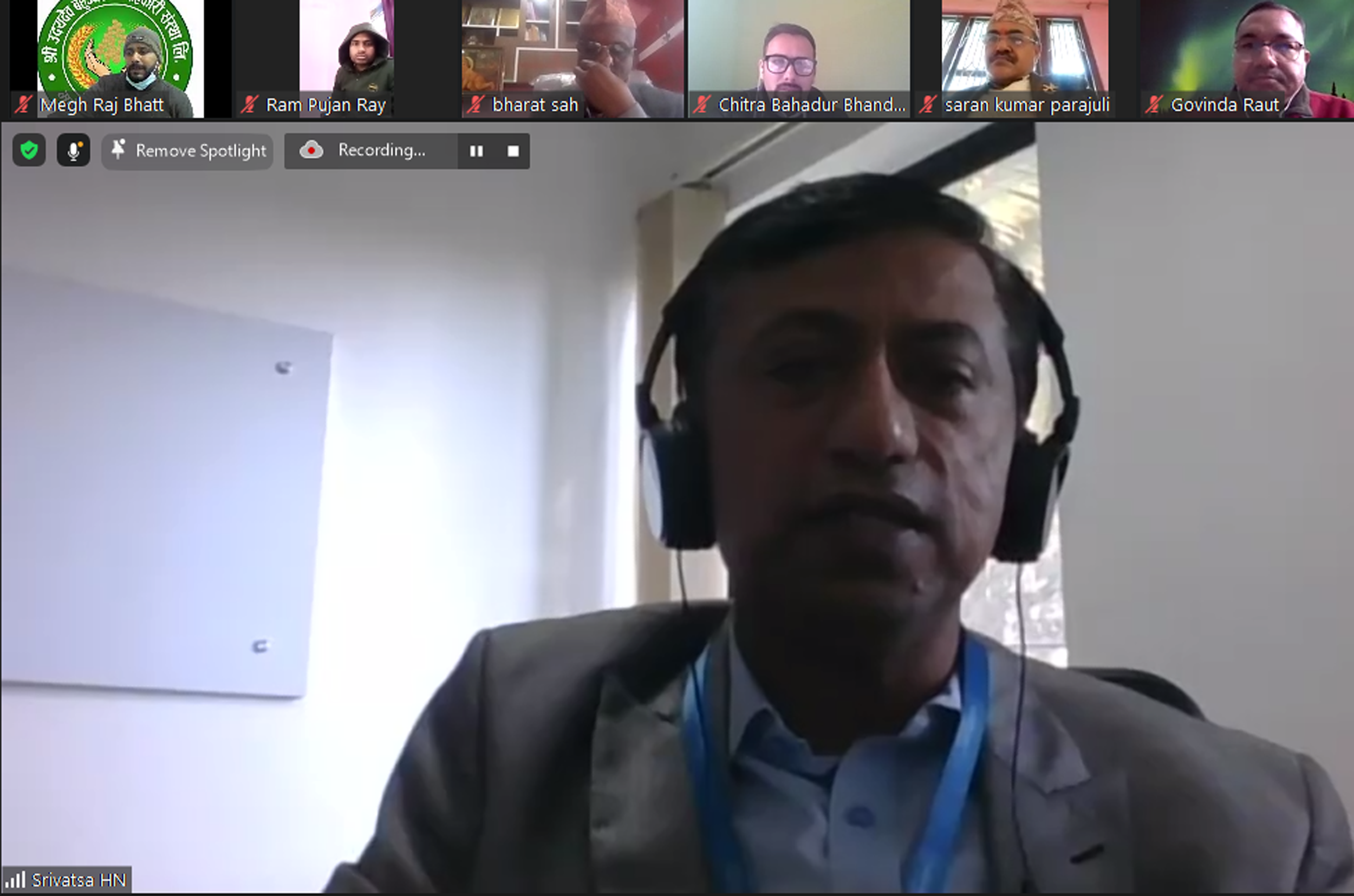
Mr. Srivatsa said, “CreditAccess Grameen Limited is the largest microfinance institution of India and also has the largest microfinance market share in the world. The institution was founded in May 1999 as a project under the T. Muniswamappa Trust (TMT), an NGO based in South Bengaluru. The Grameen Trust, Bangladesh provided seed capital funding of $35,000 to TMT for replicating the Grameen Bank Bangladesh microfinance model. The institution adapted the Grameen Bank’s group lending methodology of microfinance to the Indian environment and launched operations in Avalahalli on the outskirts of South Bengaluru. It offered collateral-free loans as well as other services to women from the bottom of the economic pyramid with the aim of creating equal opportunities and inclusive development for both rural and urban poor. The loans intended to help customers raise their standard of living and break the vicious poverty cycle. The institution steadily groomed a class of mature and financially literate women entrepreneurs who began to outgrow the group lending model. The target set of customers are women because they are ambitious and can contribute to community and country’s socio-economic environment. It has been observed that women tend to use resources more productively, thereby improving their financial access to increase their participation in the economic activities of families as well as the communities. In 2007, the microfinance activities of CreditAccess Grameen were transferred from NGO to a well-regulated and registered Non-Banking Financial Company (NBFC), which subsequently got reclassified into a regulated and governed Non-Banking Financial Company – Micro Finance Institutions (NBFC-MFI) entity by the Reserve Bank of India (RBI) in 2013. Grameen Koota continues to be the operating brand name of CreditAccess Grameen Limited (formerly known as Grameen Koota Financial Service Private Limited). A multitude of both financial plus non-financial products and services are offered to customers to cater to their life cycle needs at one of the lowest interest rates in the microfinance industry. The products are subject to periodic modifications based on feedback from customers and input from staff members.”
With regards to financial capital as of 2021 Mr. Srivatsa said, “ The gross assets under management ( AUM) is IRs 135,868.70 million (3.26% year over year (YoY)), total income IRs 24,460.72 million (+44.60% YoY), Pre-Provision Operating Profit is IRs 9,517.61 million (+36.18% YoY), Return On Assets(ROA): 0.93% and Return on Equity (ROE): 4.04% and Gross Non-performing loan (GNPA) is 7.67% and provisioning is 6.90%. Similarly, it has Adjusted ROA: 1.84%, Adjusted ROE: 7.90%, Capital Adequacy: 26.79% (31.75% standalone) and Credit Rating A+/A1+ (stable outlook). As of latest data in context to outreach/manufactured capital he said, “It is present in 14 states and one union territory, 1,545 branches across 298 districts and 15 regional/ divisional offices/ processing centres.” As for natural capital/environmental friendly investment, he said, “99.80% loans having positive environmental & social impact.” He also spoke on social and relation capital where he said, “99.98% are women borrowers and total number of loans disbursed is 2.73 million.” Regarding human capital, he said, “As of current data there are 15,308 employees and percentage of employees from local community is 97.92%.” He further added, “As of 2021 there are 1.5 products per customer (standalone), 87% customer retention rate (standalone), and 5,971 branch audits performed through automated digital application (standalone). The organization is the only MFI to integrate world standard core banking solution and perform end-to-end digitization of field operations. ”
As per the general practice of human resource and organization development practice, he said, “90% of staff are fresh when they are recruited after screening. The family members of customers are given high priority for getting recruitment in the organization. The branch managers and loan officers are rotated across different branches bi-annually. Staff are given incentive for loan disbursement, loan collection, number of customers serviced and quality of service rendered to the customers. Internet audit is done 6 times in a year in branches, 4 times in a year in regional office and 4 times in a year in head office. The internal audit team consist of 250 staff and every 5 branches have 1 audit manager and one business support manager. Quality control and field risk control are carried out which add strength to field exercise and are proactive approach for organizational transformation.”
The organization also has competitive edge in adhering latest technology based on high tech delivery model. On this, Mr. Srivasta said, “It has digitalized all customers touch points where field force are equipped with hand held tabs for managing Kendra meeting including interest collection. It has also practiced cashless disbursement/digital repayment options for customers. It also has robust core banking service (CBS) to support innovative product. Core banking allows inter-connectivity between branches of the same financial institution and facilitates management of loan, and credit processing. It has also facilitated in minimizing turn around time (TAT). Turn Around Time means the time consumed from starting a process until its completion. In the case of a loan application, the TAT will be from the submission of the loan application to the loan disbursal. Similarly, the company is also listed in Bombay Stock Exchange.”
Mr. Srivasta on geographical selection and expansion of services said,” The organization has a strategy for calibrated expansion through contiguous district based approach. It believes in deeper penetration within a particular district within three years of consecutive operation and then only opts for graduation through market diversification. The geography selection is based on availability of infrastructure, capacity, historical performance, trend, socio-economic and political climate risk and growth potential. It also ensures consistent replication and expansion of this service to other geographical areas. It also believes that faring well with demographics/culture of nearby district enables effective cultural evaluation and better serving to contiguous districts or areas.”
Regarding future upgrades, endeavors and investments, he said, “It has plan for upgrading of core banking service (CBS) to the latest version for high scalability, investment in enterprise service bus and micro service architecture external financing and fintech ecosystem. It also has strategy for enhancement of existing mobility apps including automation of entry through image reading and single platform for all apps, investment in zero code platform and tools leading to faster implementation of new technology and active exploration of partnerships with fintech players to implement them. Fintech refers to the integration of technology into offerings by financial services companies in order to improve their use and delivery to consumers digital lending and credit. The organization constantly improvises on making innovative digital solution.”
Mr. Srivatsa also shed light on integrating risk management in operating process where he said, “The purpose of the risk management policy is to provide guidance on identifying, managing and mitigating risks arising across risk taking activities in the organization to ensure sustainable profitability. The policy applies to activities and processes associated with the normal operations of the organization and covers areas such as credit risk, reputation, technology, funding, operations, regulatory, strategy, etc. The risk architecture will support our Company’s vision to be the preferred business partner of Indian households lacking access to formal credit, enriching their lives by providing convenient and reliable solutions, matching their evolving needs. For this the organization focuses on target customer segment, customer due-diligence, flexible lending model, customer engagement model, employee incentive scheme and employment rotation policy. It also had strict adherence with four practice codes which include right product, ticket size and repayment frequency, red signal for over leveraging, practice of local language and follow KYC norms of Reserve Bank of India (RBI).” Among other practices it also refrains in internal affairs of borrowers except for the purpose of transaction related matters but at the same times promotes grievance handling mechanism.
With regards to loan products, he said, “Income Generation Loan supports business enterprises and income enhancement activities of the clients like purchasing fixed assets to installing additional machinery. These loans also meet the additional working capital requirements of the client’s businesses. Grameen Koota is following weekly, fortnightly or monthly collections based on the flexibility of customers. Clients can avail loans up to IRs. 1,00,000/- for Income Generation Loans where the interest rate is 19.25% per annum on declining balances. The loan ticket is for minimum 52 weeks to maximum of 156 weeks depending on the loan amount. There are other top-up loans like home improvement loans, family welfare loan and CreditAccess Grameen. The maximum processing time of income generation loan is 14 days and the other top-up loans are disbursed in a single day. These lending are based on joint liabilities and self-help group. It also has retail loans like Grameen Udyog loan which is the flagship product under retail finance and offered to our customers who require higher loan amount in their individual capacity to meet their working. Customers can avail loan up to IRs.1,50,000/- with interest rate of 22% per annum on reducing balance and the tenure is 24 months. Similarly, another type of retail lone is Grameen Vikas loan. This is a high ticket asset backed business loan, offered to the customers who have high credit requirement for business expansion and inventory purchase. Customers can avail loan up to Rs.5,00,000/- with interest rate of 22% per annum on reducing balance. The tenure is minimum 24 months to maximum 60 months depending on the loan amount. Similarly, Grameen Savaari Loan, another type of retail loan, is offered to the customers for purchase of new two-wheelers, which will provide support in their income generation activity. Customers can avail loan up to Rs.70,000/- The interest rate is 22% per annum on reducing balance and the tenure is 24 months. Another retail loan, Grameen Suvidha loan are offered as intermediary loans to the customers to meet additional needs and is usually given for the upkeep of assets or inventory related to business. Customers can avail loan up 15% of sanctioned Udyog/Savaari loan amount. The interest rate is 22% per annum on reducing balance and the tenure is 6 months. Apart from loans, it also has schemes like life insurance and NPS Swavalamban Launched in 2009 by Government of India, the National Pension Scheme from PFRDA made way for every working citizen of India to save part of their income for their pension. As an aggregator of the National Pension Scheme (NPS), CA Grameen collects the contribution amount from the customers at the branch office. In lieu of the same, CAGL is issuing contribution receipts to the members. The NPS contribution amount is deposited in NPS Swavalamban account of the members with TAT”.
Mr. Srivatsa also spoke on factors or influences that impact the operation of business, where he said, “The organization has categorized factors that influence the business as external environment, inputs and outputs. An external environment is composed of all the outside factors or influences that impact the operation of business. The success of the company depends on its ability to adapt to the changing environment. For example the technological environment is ever evolving and technology upgradation as well as choice of right technology is the critical factor that either enriches the organization or may be cause for its downfall or doom. Other factors are financial inclusion, financial literacy, digital literacy, evolving customer behavior, awareness on health and education, rural economic condition, climate change, market force, regulators and socio-political environment where the company is constantly adapting to the change in the environment. The severity and effect of pandemic also comes under external environment. Similarly, inputs are composed of various elements present inside the organization that can affect or can be affected with, the choices, activities and decisions of the organization like financial aspects where the organization gives emphasis on diversified lender’s base, longer tenor borrowings and cost of fund. For manufacturing/service the organization focuses on pan India presence, deep rural presentation, branches and offices. Regarding delivery mechanism/human resource the company gives emphasis on young workforce, rural recruitment, extensive training, employee retention and benefit and growth. In context to intellectual aspect the organization emphasizes on stable and scalable technology infrastructure, risk management framework and prudential provisioning. Regarding social relationships the organization gives preference on customer engagement, community investment/CSR initiative, investors/lenders/lending agencies engagement and regulations as well as advocacy and lobbying mechanism for government agencies, central banks and other regulating agencies. This has given stellar outputs in financial capital with highest worldwide assets under management (AUM), best operating efficiency in India and high percentage of active borrowers. It has made mark in human capital including “Great Place to Work” and amongst India’s best workplace in BFSI 2020-Top 30. Regarding intellectual capital it has 87% (standalone) customer retention rate and end to end digitalization of field operations. In terms of social relationship standard it has achieved a comprehensive social rating of Σa with positive outlook from MCril.
One of the participants Mr. Udaya Raj Khatiwada, CEO of the Swabalamban Laghubitta Bittiya Sanstha Ltd queried on the techniques to reduce operation cost. Regarding this, Mr. Srivatsa said, “One of the important strategies is to opt for market penetration where it is necessary to have less number of centers but more customers so that the field officer will be able to handle more number of customers thereby optimizing his/her centre visits by having contacts with more customers. Another strategy is to focus on product diversity where a customer is eligible for various loans at one time. This will help in customer retention and discourage multiple borrowing because the customer after being eligible for income generating loan will also qualified for other top up loans like home improvement loan or family welfare loan. Other technique is build robust monitoring, business, R&D and risk structure which will help in developing customer friendly and market oriented products which will also help minimize risk, curtail default and at the same time lower credit cost, enhance quality and support in optimizing resources. Similarly it is also necessary to focus on customer centric approach where the staff members make periodic field visits and incorporate valuable inputs like ticket size and type of loans thus incorporating bottom up approach of planning which can be valuable in reshaping the policies and working modality of the organization. Developing and prescribing policies, strategies and working procedures inside closed doors and cubicle of the organization will be counterproductive.”
Another participant Mr. Govind Raut, Assistant CEO of Muktinath Bikas Bank Ltd queried on the gross non-performing asset (GNPA) due to the effect of lockdown as well as Jagrati Program currently being implemented by the organization. To this Mr. Srivatsa said, “ GNPA is directly related to microeconomic factor which has affected hospitality business as well as major part of service industry. Having said that, the impact of loan default in our organization is one of the lowest in this sector. We believe in expediting loan processing mechanism but take utmost care in loan appraisal techniques. For income generating loan, it takes a maximum of 2 weeks to process and for other top-up loans under IRs. 15,000 it is processed in a single day. A declaration is taken from the customer to deposit the amount in a particular bank and the amount is deposited in that bank as per the customer’s choice. The process is further expedited in case of top-up loans due to usage of tablets and opting for paperless system. Similarly, Jagrati Program is based on social awareness on social aspect and not based on marketing concept to build, enhance and expand commercial purpose. During the COVID-19 pandemic short videos like vaccination drive and similarly during monsoon precautionary measures on malaria were shown. The first 10 minutes of centre meeting is allocated for loan collection, the next 10 minutes for orientation towards loan products and the last 10 minutes is allocated for Jagrati Program where a readymade letter on social issues/affairs is read to the customers through tablets.”
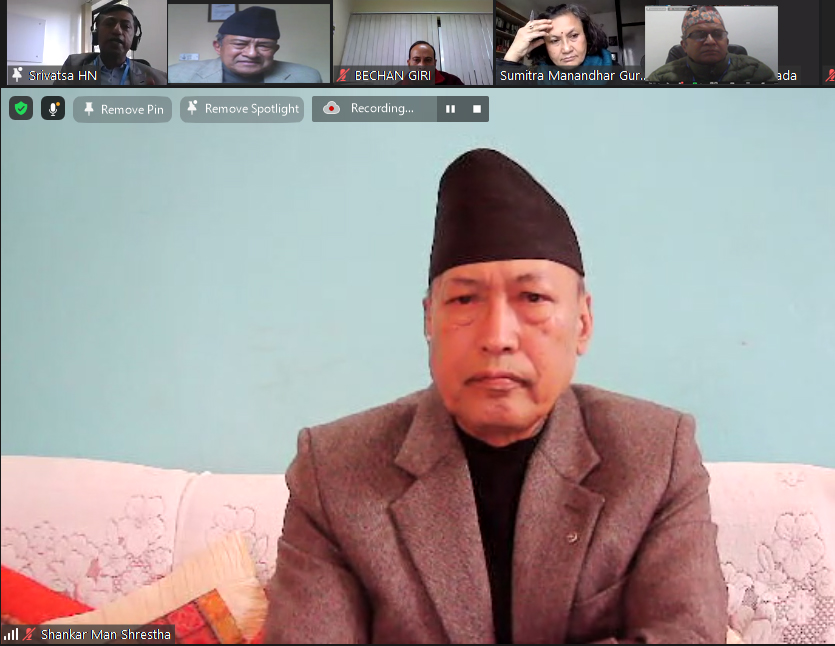
Mr. Shankar Man Shrestha, Chairman of CSD and chair of the webinar talk program said, “Grameen Koota is adhering to Grameen Model as well as maintained its core values, code of conduct, follows strict compliance mechanism and has not compromised on the fundamentals of microfinance. The same cannot be said about MFIs in Nepal whose prime motive is profit maximization thereby relinquishing the basic tenets of microfinance. Nepalese microfinance can learn from successful national and international MFIs which will help attain mutual growth and overall sustainability of the sector.” In the end he thanked webinar moderator, key speakers as well as all the participants present for making it lively, interactive and successful.
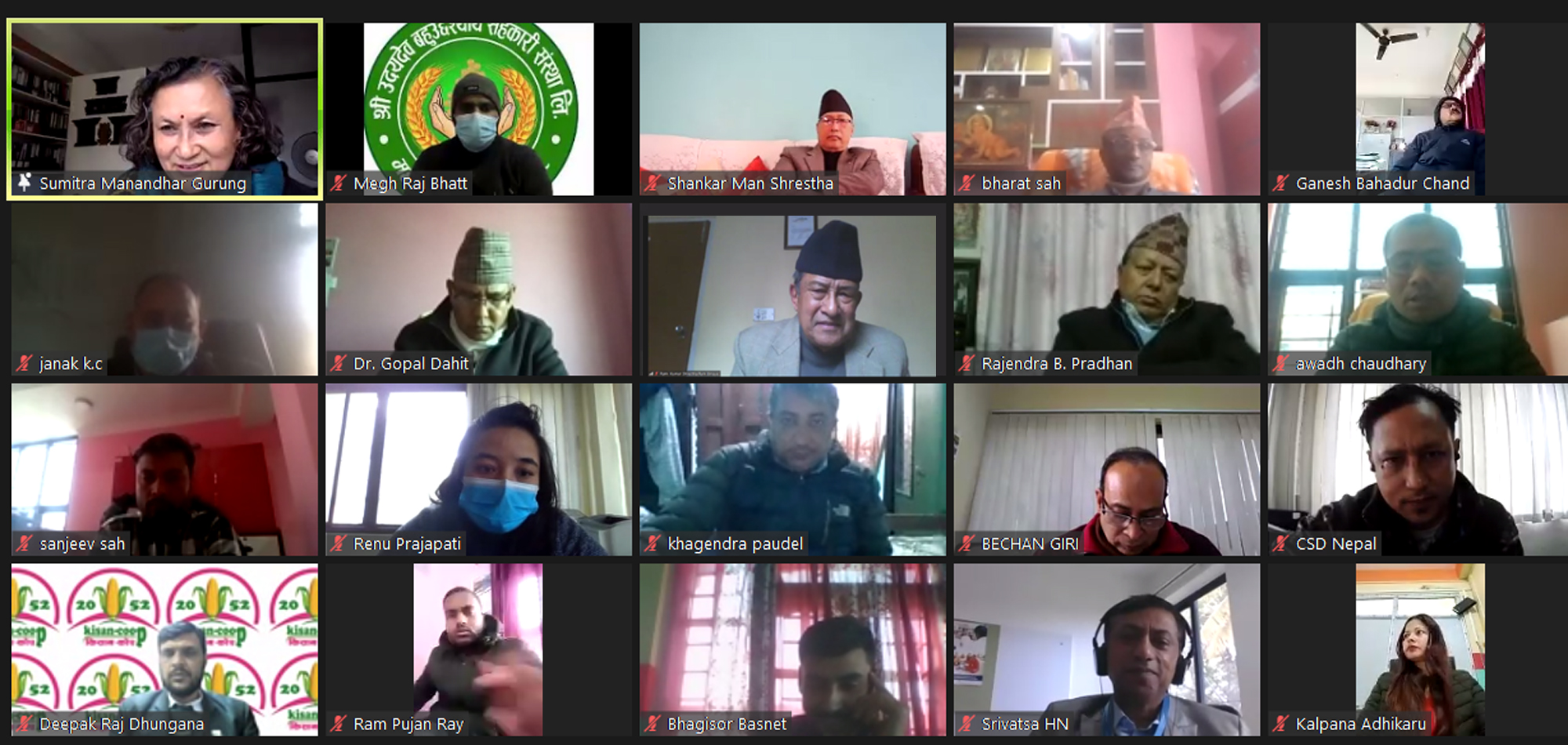
Under the initiation of the principle Microfinance Institutions (MFIs) and co-ordination of the Centre for Self-help development (CSD) a first ever, national level 'National Microfinance more...
“Entrepreneurship Development, the Way towards Poverty Alleviation”
For the first time in the history of microfinance in Nepal, and unheard of in the global more...
In view of the stir created by the new Monetary Policy of the Nepal Rastra Bank (NRB) among the Microfinance Institutions (MFIs), the Centre for Self-help Development (CSD) felt the need more...
On Shrawan 28, 2073 (August 12, 2016) promoters, individuals and institution members, former Board Directors, Microfinance Institution leaders and friends came together at the Hotel Yellow more...
The Centre organized a two-day seminar for the Board Officials of the prominent microfinance cooperatives of Nepal on the request of various Cooperative Institutional Members of the Centre more...
‘Learning gives creativity, Creativity leads to thinking, Thinking provides knowledge, Knowledge makes you great’ – APJ Abdul Kalam
Kick starting the year 2017, the Centre for more...
On the morning of February 9, 2017 the Centre for Self-help Development (CSD) in joint collaboration with the Grameen Trust (GT), Bangladesh initiated a two-day program on the Grameen more...
A nine member team comprising Board of Directors from 2 FINGOs from Nepal, namely- Dhaulagiri Community Development Centre (DCRDC, Baglung) and Sreejana Community Development Centre (SCDC, more...
It is with deep sorrow and regret we bid farewell to Mr. Nanda Ram Baidya who passed away on August 15, 2017. In memory of the affable and ever encouraging figure the Centre for Self-help more...
On the morning of March 9, 2017 the Centre for Self-help Development organized an interaction program on an experience sharing session with Mr. Chandra Shekhar Ghosh, Founder and Managing more...
The Centre for Self- help Development (CSD) organized a training program titled "Advanced Training of Trainers" held in Kathmandu. The five day training program was held from September more...
Over the years, the Microfinance Institutions (MFIs) in Nepal have been proactive in providing financial as well as social services to vitalize the financially excluded households in more...
The pioneer microfinance institution of Nepal, the Centre for Self-help Development (CSD) convened its 26th Annual General Meeting on October 8, 2017 amidst its members, both individual more...
- An experience of Nepalese Delegation
A delegation of Nepalese microfinance officials visited the Philippines from January 15-19, 2018 on the invitation of the Microfinance Council of more...
CSD has appointed Mr. Bechan Giri as the new Executive Chief effective from December 26, 2017. Mr. Giri’s appointment comes with the resignation of former Executive Chief of CSD, Mr. more...
To enable microfinance institutions to apply sound accounting principles to ensure high quality of financial analysis the Centre for Self-help Development conducted a three-day training more...
- A Symposium of Board Officials
In over 25 years of service to the financially excluded segments of the society, the microfinance sector has thrived and expanded its outreach to the more...
Keeping in view the strong and rapid growth pattern in the microfinance sector and the competitive lending environment, CSD organized a three day training program titled "Training on Risk more...
“Learn as if you were to live forever” – Mahatma Gandhi
Realizing the immense potential to learn from each other through experience sharing and field visits within the country itself, more...
When the fundamentals of microfinance are followed, great outcomes are achieved. This is true with Bandhan Bank which has been given universal banking license by the Central Bank of India more...
Bangladesh is often hailed as the ‘Mecca of Microfinance’ across the world. The concept of micro-credit and the credit worthiness of the poor was first discussed by Prof. Muhummad Yunus in more...
(1).jpg)
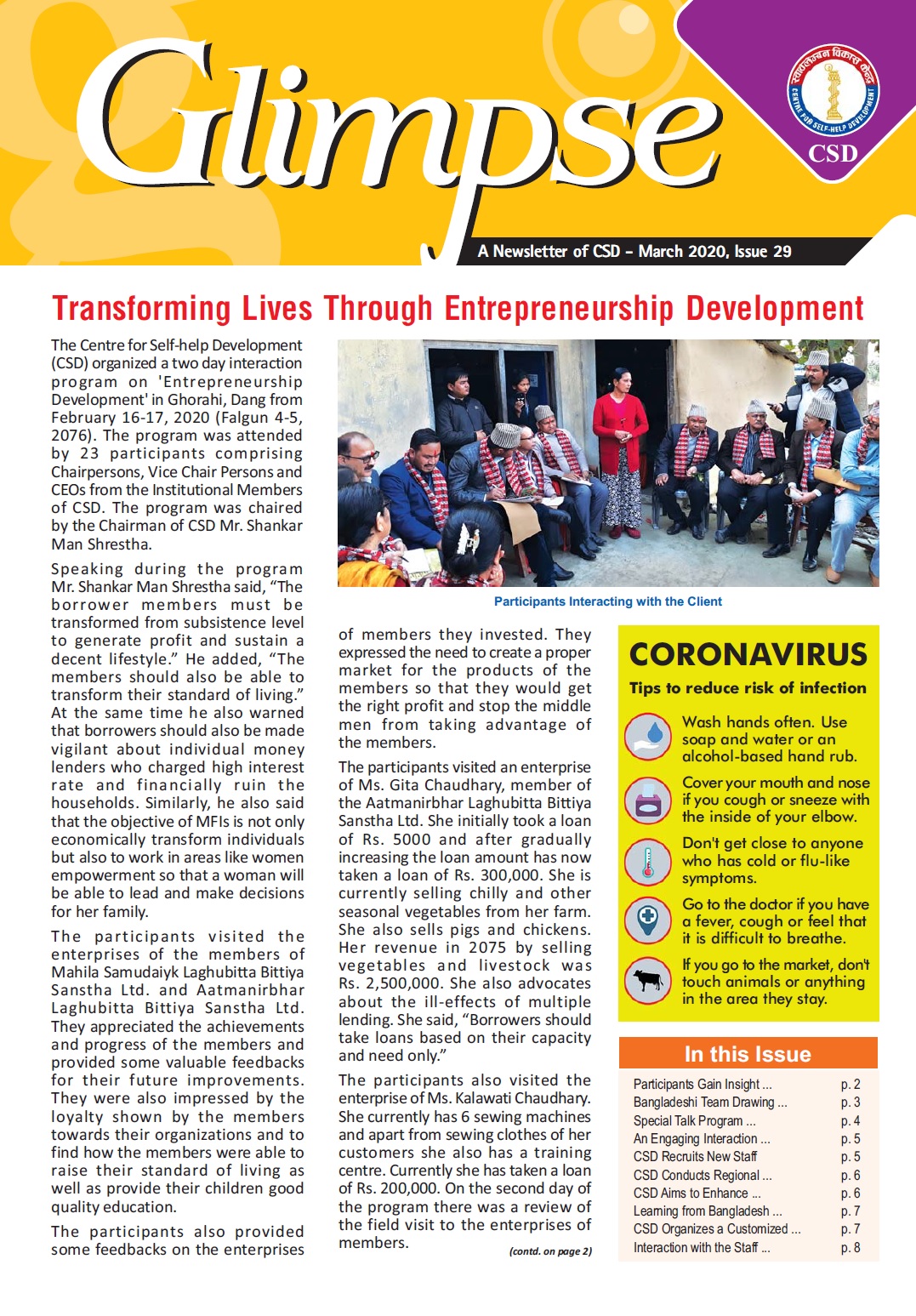
One of the pioneering institutions to provide microfinance services in Nepal the first licensed NGO, the Centre for Self-help Development (CSD) celebrated its 27th Anniversary at a more...
The Centre for Self-help Development (CSD) one of the pioneers of microfinance in Nepal convened its 27th Annual General Meeting on October 26, 2018 in Kathmandu. The meeting was attended more...
A training to develop “Managerial Skills” of Branch Managers of MFIs was organized by CSD in Kathmandu from January 7-9, 2019 (Poush 23-25, 2075) to enhance managerial skill level of the more...
A one-day dialogue on microfinance was organized by Unique Nepal Laghubitta Bittiya Sanstha Ltd. on February 9, 2019 (Magh 26, 2075) in Hotel Atithi, Kohalpur. A total of 42 participants, more...
On the invitation of the Grameen Trust, Bangladesh a delegation of nine senior Nepalese microfinance practitioners led by Mr. Shankar Man Shrestha, Chairman of CSD visited Bangladesh from more...
The team observed that all the members are borrowers and strictly followed the basic fundamental of microfinance like conducting weekly meeting, implementing credit plus activities, more...
The microfinance sector in Nepal has been mushrooming at an alarming rate in the past five years. Newer microfinance institutions (MFIs) have sprung up, who do not necessarily follow the more...
“If we can turn unemployment into entrepreneurship, the amount of human creativity, talent and productivity we will unleash is almost beyond measuring” – Prof. Muhammad Yunus
Taking more...
The Centre for Self-help development (CSD) organized a conference on Human Resource Management for microfinance Institutions from Ashadh 10-11, 2076 in Dhulikhel, Kavre. The conference was more...
From June 28 – 29, 2019 over 1,500 delegates from across the world came together to celebrate and take forward social business on a global scale at the 9th Social Business Day (SBD) held more...
Microfinance has existed as one of the major contributors to poverty alleviation serving over 4 million members in the seventy seven districts of Nepal. But in recent times the sector has more...
One of the initiators of microfinance services and the first licensed microfinance NGO in Nepal, the Centre for Self-help Development (CSD) celebrated its 28th Anniversary at a function more...
.jpg)
The Centre for Self-help Development (CSD), which is one of the pioneer institutions to launch microfinance in Nepal, convened its 28th Annual General Meeting on December 13, 2019. The more...
The Centre for Self-help Development (CSD), which is one of the pioneer institutions to launch microfinance in Nepal, organized a Symposium on Fraud Control and Management on December 14, more...
CSD Chairman Mr. Shankar Man Shrestha felicitated on January 21, 2020 by the Agricultural Development Bank on the occasion of its 53rd Anniversary for his valuable contribution to the more...
With the rapid expansion of microfinance sector in past few years in Nepal, the sector has been facing numerous problems and challenges due to deviations from the true essence and more...
The Centre for Self-help Development (CSD) has entered in 30th year. It was established on August 13, 1991 (Shrawan 28, 2048) with the vision of alleviating poverty by raising the living more...
The Chairman of the Center for Self-help Development (CSD), Mr. Shankar Man Shrestha in a webinar organized by CSD on Bhadra 2, 2077 (August 18, 2020) urged the officials of Kisan more...
A webinar was organized by the Centre for Self-help Development on March 2, 2021 to acquaint development practitioners with basic concept of eco-village model, its approach and possible more...
CSD has expanded its team members to better coordinate and cope with the new activities as well strengthen the standard of its service delivery. It is very fortunate to have additional 5 more...
The extent of the damage that the novel coronavirus pandemic is causing is mind-boggling. However, the situation also offers us an unparalleled opportunity.We have experience in managing more...
The Sree Ram Higher Secondary School, Koshidekha, Panchkhal Municipality ward no 13, Kavrepalanchok district launched a student entrepreneurship development program in cooperation with the more...
The Centre for Self-help Development (CSD) has entered in 30th year. It was established on August 13, 1991 (Shrawan 28, 2048) with the vision of alleviating poverty by raising the living more...
CSD organized a virtual interaction with its member cooperative organizations on August2, 2020 to discuss on problems and challenges and opportunities arisen from the corona virus pandemic more...
Chairman of the Centre for Self-help Development Mr. Shankar Man Shrestha has suggested the microfinance staff to face the Corona epidemic and lockdown crisis while maintaining the essence more...
The Chairman of the Center for Self-help Development (CSD), Mr. Shankar Man Shrestha in a webinar organized by CSD on Bhadra2, 2077 (August 18, 2020) urged the officials of Kisan more...
The Center for Self- help Development (CSD) organized a 3 day PPI Training of Trainers (TOT) to 23 senior officials and branch managers of microfinance institutions in Biratnagar in more...
The Centre for Self-help Development (CSD) organized a study/exposure visit to Bangladesh from March 19-26, 2023. The visit team consisted of nine Board Members and one staff member of more...
The Chairman of the Centre for Self-help Development (CSD) Mr. Shankar Man Shrestha has suggested the microfinance practitioners to study and review the problems and opportunities faced more...
The Centre for Self-help Development (CSD) has instituted Micro-Entrepreneurship Award for three outstanding micro-entrepreneurs from among the women members MFIs. The award carries Rs. more...
Centre for Self-help Development (CSD) organized two day of Virtual training on "Promotion and Development of Micro-entrepreneurship among microfinance Members" on November 24-25, 2020 more...
During the lockdown period, the Centre for Self-help Development (CSD) conducted online interactions with CEOs and Department Heads of its member organizations. A total of six online more...
The Centre for Self-help Development (CSD) convened its 29th Annual General Meeting (AGM) on November 27, 2020 (Marg 12, 2077). The AGM was attended by 9 individual and 38 institutional more...
CSD Chairman Mr. Shankar Man Shrestha felicitated on January 20, 2020 by SLBBL on the occasion of its 19th Anniversary for his valuable contribution to the creation and development of the more...
CSD organized two day virtual training on "Identification and Development of Micro-Entrepreneur Members" from Magh18-19,2077, (Jan31-Feb1, 2021) where17 branch managers and senior field more...
The Centre for Self-help Development (CSD) has provided a desktop computer with necessary accessories to Kunchipwakal Secondary School under the Tarkeshwor Municipality-1, Kathmandu in its more...
The Centre for Self- help Development (CSD) organized a virtual webinar on “Sharing Grameen Bank Experience on Managing Impact of COVID 19 Pandemic and Post COVID Programs” on 20th January more...
The Centre for Self-help Development (CSD) awarded three best Microfinance Entrepreneurs members with the title of “Best Micro-entrepreneur Award-2076.” Honorable Minister for Land more...
The Chairman of the Centre for Self-help Development (CSD) Mr. Shankar Man Shrestha handed over a cheque of Rs. 2 lakh to the Samata Education Trust on March 9, 2021 as a token of support more...
On March 05, 2021 (Falgun 21, 2077) the Centre for Self-help Development (CSD) successfully completed a review webinar on the action plan developed by participating branch managers of more...
The Center for Self-help Development (CSD) conducted a two–day training on “Leadership Development and Stress Management” in microfinance on March 18-19, 2021 (Chaitra 05-06, 2077). The more...
With the main objective of knowing the knowledge and skill gained during the training "Gear up yourself" which was held on January 18-19, 2021(Magh 5-6, 2077) is practically applicable to more...
The Centre for Self-help Development (CSD) conducted a two-day virtual training on "Identification and Development of Micro–entrepreneur Members in Microfinance on March 14-15, more...
CSD on Chaitra 02, 2077 (March 15, 2021) hosted yet another webinar as part of Experience Sharing forum for microfinance institutions officials. This webinar talk program was participated more...
A webinar was organized by the Centre for Self-help Development (CSD) on March 30, 2021 to apprise microfinance practitioners and other stakeholders on problems and effects caused by more...
The Centre for Self-help Development (CSD) organized a webinar talk on April 16, 2021 to sensitize microfinance practitioners and other stakeholders on policy level as well as practical more...
A webinar talk on Vitality and Vulnerability of Wholesale Lending Organizations in the Present Niche Market of Microfinance was organized by the Centre for Self-help Development (CSD) on more...
A webinar on Neutralizing Corona Impact on Microfinance was organized by the Centre for Self-help Development (CSD) on May 13, 2021. The second wave of COVID-19 in Nepal is more lethal and more...
A webinar talk program on “Happy Leaders Can Change the World” was organized by the Centre for Self-help Development (CSD) on May 31, 2021 with the aim to to discuss on the concept of more...
A webinar talk (Series No 9) on Secrets of Success in Microfinance was organized by the Centre for Self-help Development (CSD) on June 16, 2021. The webinar focused on philosophy and more...
The leaders in the field of microfinance are of the view that a time has come for all microfinance institutions to digitize microfinance services to provide easy access to the deprived and more...
Microfinance has completed a three-decade long journey in Nepal. With continuous campaigns, it had brought awareness among the poor women in rural Nepal. Microfinance practitioners have more...
Four institutional members of the Centre for Self-help Development (CSD) have been accredited by the international “Smart Campaign, Client Protection Certification.” The awardees are the more...
The Training of Trainers (ToT) aiming to spread covid-19 education among the community was organized jointly by the Centre for Self-help Development (CSD) and RMDC Laghubitta Bittiya more...
Expressing concern over the growing discrepancies and deviations in microfinance, experts have warned microfinance practitioners and stakeholders to be vigilant in time. In the webinar more...
The Centre for Self-help Development (CSD) established in 1991 with the objectives of creating poverty free self-help society through awareness rising and of the masses and mobilization of more...
The Centre for Self-help Development (CSD) has organized two days long training on Participatory Rural Appraisal (PRA) on August 20-21, 2021 for the 16 high officials of the Centre for more...
The Centre for Self-help Development (CSD) had initiated a new approach to the follow-up of the training conducted by it with a view to ensure that the skills learned by the training are more...
A webinar talk series (Episode 14) on “Microfinance Policies, Practices and Problems in Sri Lanka” was organized by the Centre for Self-help Development (CSD) on September 6, 2021, with more...
The Centre for Self-help Development (CSD) held a six-month progress review of its second training on "Identification and Development of Micro-entrepreneurs" on September 12, 2021, which more...
A virtual Master Training of Trainers (ToT) to educate communities on COVID-19 via ZOOM was jointly organized by the Centre for Self-help Development (CSD) and RMDC Laghubitta Bittiya more...
Experts have argued that the lack of good governance in Microfinance Institutions (MFIs) has led to deviations from its main mission of serving the lower strata of the population and more...
Microfinance institutions have a strong belief that their grass-root level financial inclusion program has bestowed the fight against global challenges such as poverty, unemployment, and more...
A tripartite agreement on "Self-help Eco-village Development" was signed between the Centre for Self-help Development (CSD), the Mahila Sahayogi Bachat Tatha Rin Sahakari Sanstha Ltd. more...
The Centre for Self-help Development (CSD) convened its 30th Annual General Meeting (AGM) on December 2, 2021 (Marg 16, 2078). The AGM was attended by 6 individual and 26 institutional more...
On 13th of December 2021, the Centre for Self-help Development (CSD) put forward its 17th episode of webinar entitling "Human Resource Development and Management in Microfinance more...
CSD organized a two day "Mindful Leadership Development" Program for the Chairperson, CEOs and DCEOs of Microfinance Institutions and Cooperatives operating microfinance program from more...
The Centre for Self-help Development (CSD) organized a webinar talk on “Experience of Grameen Koota on Poverty Reduction and Employment Creation in India” to acquaint microfinance and more...
The Centre for Self-help Development (CSD) has organized a two-day leadership development training to increase women participation in management decision level of the Microfinance with more...
Kathmandu. Three women entrepreneur members who became successful entrepreneurs by taking loans from different microfinance institutions have been awarded the Best Micro-Entrepreneur more...
A webinar talk (episode no. 19) on “Entrepreneurship Development among Students-An Experience of Janajyoti Higher Secondary School, A Rural School of Surkhet District” was organized by the more...
The Sree Ram Higher Secondary School, Koshidekha, Panchkhal Municipality ward no 13, Kavrepalanchok district launched a student entrepreneurship development program in cooperation with the more...
The Centre for Self-help Development (CSD) convened 12th Social Business Day 2022, Country Forum of Nepal on June 29, 2022 based on the theme, “Building a New Civilization-Before the more...
The Centre for Self-help Development (CSD) which is the pioneer NGO in microfinance sector celebrated its 31st anniversary on 13th August, 2022 (Shrawan 28, 2079). During the occasion, more...
The Centre for Self-help Development (CSD) organized three Exposure Visits of microfinance practitioners of different Microfinance Institutions (MFIs) and Microfinance Cooperative more...
CSD organized a week long exposure/study visit of Nepali MFIs to Socialist Republic of Vietnam from August 13 to 20, 2022 to learn the microfinance policies, programs, approaches and more...
The Centre for Self-help Development (CSD) in partnership with the University of New South Wales (UNSW), Sydney, Australia, organized a seminar on the topic "Emerging Challenges and more...
Branch managers and employees of microfinance institutions were encouraged to mobilize more resources in their hands for reliability of financial resources supporting for lending the more...
A review program was conducted on February 27, 2023 with the participation of the heads of MFIs to discuss the latest status and progress on the implementation of 11-point declaration of more...
A five-day specially tailored program on entrepreneurship development was organized by Centre for Self-help Development (CSD) for the Branch Managers of Swabalamban Laghubitta Bittiya more...
Convoked 31st General Assembly of CSD: Emphasized on Promotion of Social Entrepreneurship and Expansion of Microfinance Reach to Hard-Core Poor
The 31st General Assembly of the Centre more...
The 31st General Assembly of CSD has elected a seven-member Board of Directors for the next two years. In this committee, the elected members are: the founding members of CSD, Mr Shankar more...
The Center for Self- help Development (CSD) organized a 3 day PPI Training of Trainers (TOT) to 23 senior officials and branch managers of microfinance institutions in Biratnagar in more...
Experts are of the view that the 8-point directive of the Nepal Rastra Bank (NRB) will help to improve the quality as well as the strength of the microfinance sector in long term and bring more...
The Centre for Self-help Development organized an online orientation program on “Progress out of Poverty (PPI) Index” on November 8, 2022. The objective of the program was to orient more...
In the last two decades microfinance in Nepal has taken a big leap forward in terms of the number of institutions providing loans, volume of loan transactions and the number of client more...
The First Provincial Microfinance Members' Summit of the Koshi Province was concluded with the vow to make microfinance services civilized, dignified and effective and also decided to more...
The Centre for Self-help Development (CSD) organized a 4 day field based Self-help Eco-village Development workshop from January 29 to February 1, 2023 at Dhulikhel Lodge Resort, more...
The Centre for Self-help Development (CSD) has initiated an entrepreneurship development program with the aim of developing about 5,000 entrepreneur women among microfinance members within more...
The Centre for Self-help Development (CSD) organized a study/exposure visit to Bangladesh from March 19-26, 2023. The visit team consisted of nine Board Members and one staff member of more...
On the occasion of 32nd Anniversary of the Centre for Self-help Development held on August 13, 2023, MFIs and microfinance practitioners who have made outstanding contribution in providing more...
Shankar Man Shrestha Microfinance Award is provided to any individual or institution that adheres to the norms, principles and values of microfinance and acts as a role model in carrying more...
The Centre for Self-help Development (CSD) awarded Micro-entrepreneurship Development Award and Best Entrepreneurs award for the year 2023 2023 on the occasion of its 32nd Anniversary more...
In a proactive effort to fortify the microfinance sector, the Centre for Self-help Development (CSD) orchestrated a successful three-day training program titled "Internal Audit & Control" more...
The first ever conference with the aim to completely eliminate three burning issues prevalent in today’s world which are poverty, employment and net carbon emission by brining youths in more...
On the occasion of 4th Nation Microfinance Member Summit 38 MFIs members, staffs, centre chief, 3 Zero Club were recognized & appreciated. Where 11 Centre Chief, 1 organization, 10 Staff, more...
The 32nd Annual General Meeting of the Centre for Self-help Development (CSD) was held on Sunday, December 10, 2023. The meeting decided to urge MFIs and MFCs to work to improve the more...
The Centre for Self-help Development (CSD) which is the pioneer NGO in microfinance sector in Nepal celebrated its 32nd anniversary on 13th August, 2023 (Shrawan 28, 2080).
With the theme “Prudent Microfinance, Prosperous Members”, the 4th National Microfinance Members' Summit, Nepal concluded with the issuance of a comprehensive 12-point declaration, more...
The Centre for Self-help Development (CSD) have awarded three best entrepreneur members and one best entrepreneurship development organization for their outstanding performance on the more...
A conference with the aim to completely eliminate three burning issues prevalent in today’s world which are poverty, employment and net carbon emission by brining youths in decision making more...
On the occasion of 4th Nation Microfinance Member Summit 38 MFIs members, staffs, centre chief, 3 Zero Club were recognized & appreciated. Where 11 Centre Chief, 1 organization, 10 Staff, more...
The Centre for Self-help Development (CSD) organized a 4-day Training on Entrepreneurship Development including one day field study visit of successful client entrepreneur from May 7th to more...
A total of 13 microfinance practitioners from 9 different organizations participated in a 10-day long training of trainer (TOT) organized by Training Institute for Technical Instruction more...
With the aim of spreading entrepreneurship in the community by making the poor and underprivileged self-reliant and entrepreneurs through microfinance finance institution (MFIs) and more...
The global marketplace is rapidly shifting towards digitalization to enhance consumer access, need & satisfaction. There is vast untapped marketplace for Micro entrepreneurs members from more...
Symposium on Strengthening Microfinance in Nepal was organized by the Centre for Self-help Development (CSD) on 27th July, 2024 (Ashad 12, 2081) at Hotel Yellow Pagoda, Kantipath, more...
The Centre for Self-help Development (CSD) held its 33rd Annual General Assembly on December 2, 2023. The meeting urged microfinance institutions to prioritize socio-economic development more...
The Centre for Self-help Development (CSD) celebrated its 33rd anniversary on 12th August, 2024 (Shrawan 28, 2081) amidst a function in Kathmandu.
The program was chaired by the Chairman more...
The rate of bad loans has been increasing in microfinance institutions with the increasing trend of borrowings for non-productive and consumption purpose by the client members. As obvious, more...
